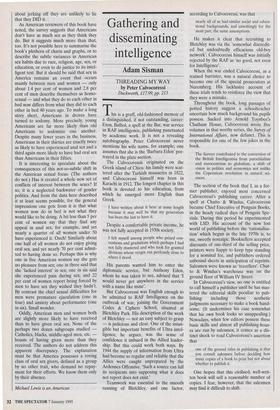Gathering and disseminating intelligence
Adam Sisman
THREADING MY WAY by Peter Calvocoressi Duckworth, i17.99, pp. 213 This is a gruff, old-fashioned memoir of a distinguished, if not outstanding, career: Eton, Balliol, a spell at the Bar, war service in RAF intelligence, publishing punctuated by academic work. It is not a revealing autobiography. Peter Calvocoressi never mentions his wife name, for example; one assumes that she is the 'Barbara Eden' por- trayed in the plate section. The Calvocoressis originated on the Greek island of Chios: his family were scat- tered after the Turkish massacres in 1822, and Calvocoressi himself was born in Karachi in 1912. The longest chapter in this book is devoted to his education, from which he emerged more English than Greek.
I have written about it here at some length because it may well be that my generation has been the last to have it.
Despite a comfortable private income, he was not fully accepted in 1930s society.
I felt myself among people who prized con- ventions and gradations which perhaps I had not fully mastered and who took for granted divisions whose verges ran perilously close to where I stood.
His parents wanted him to enter the diplomatic service, but Anthony Eden, whom he was taken to see, advised that 'I would never get anywhere in the service with a name like mine'.
But Calvocoressi was English enough to be admitted to RAF Intelligence on the outbreak of war, joining the Government Codes & Ciphers School, situated at Bletchley Park. His description of the work of Bletchley — not an easy subject to grasp — is judicious and clear. One of the intan- gible but important benefits of Ultra intel- ligence, he argues, was the sense of confidence it imbued in the Allied leader- ship. But this could work both ways. By 1944 the supply of information from Ultra had become so regular and reliable that the Allies were caught unprepared by the Ardennes Offensive. 'Such a source can lull its recipients into supposing what it does not report does not exist.'
Teamwork was essential to the smooth running of Bletchley, and one factor, according to Calvocoressi, was that
nearly all of us had similar social and educa- tional backgrounds, and unwittingly for the most part, the same assumptions.
He makes it clear that recruiting to Bletchley was via the 'somewhat discredit- ed but undoubtedly efficacious old-boy network'. Calvocoressi himself was initially rejected by the RAF as 'no good, not even for Intelligence'.
When the war ended Calvocoressi, as a trained barrister, was a natural choice to become one of the special prosecutors at Nuremberg. His lacklustre account of these trials tends to reinforce the view that they were a mistake.
Throughout the book, long passages of potted history suggest a schoolteacher uncertain how much background his pupils possess. Sucked into Arnold Toynbee's Chatham House, Calvocoressi wrote five volumes in that worthy series, the Survey of International Affairs, now defunct. This is responsible for one of the few jokes in the book.
The Surveys contributed to the conversion of the British Intelligentsia from parochialism and eurocentrism to globalism, a shift of vision in politics and economics not unlike the Copernican revolution in natural sci- ences.
The section of the book that I, as a for- mer publisher, enjoyed most concerned Calvocoressi's publishing career. After a spell at Chatto & Windus, Calvocoressi became Chief Executive of Penguin Books, in the heady radical days of Penguin Spe- cials. During this period he experimented with LSD. His account of the now lost world of publishing before the 'rationalisa- tion' which begun in the late 1970s is, to me, sweetly nostalgic. Booksellers accepted discounts of one-third of the selling price, printers were happy to keep type standing for a nominal fee, and publishers ordered unbound sheets in anticipation of reprints. Salesmen were known as 'travellers'. Chat- to & Windus's warehouse was on the ground floor of William IV Street.
In Calvocoressi's view, no one is entitled to call himself a publisher until he has mas- tered the editorial skills peculiar to pub- lishing: including those aesthetic judgments necessary to make a book hand- some. (It undermines his case somewhat that his own book looks so unappealing.) Nowadays, when few editors possess these basic skills and almost all publishing-hous- es are run by salesmen, it comes as a dis- tinct shock to read Calvocoressi's assertion that
one of the ground rules in publishing is that you consult salesmen before deciding how many copies of a book to print but not about whether to publish it.
One hopes that this civilised, well-writ- ten book will sell a reasonable number of copies. I fear, however, that the salesmen may find it difficult to shift.


















































 Previous page
Previous page